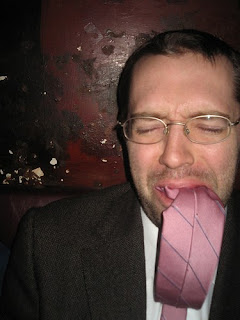i was watching the NewsHour last night and they had an interview with a guy who wrote a book about how the internet is destroying our culture, mainly because blogs and the like are cluttering our consciousness with mindless crap, unfortunately taking the place of more traditional cultural mainstays. i think i agree with his point; however, one point that i do not agree with him on: he thinks that people should be passive consumers or absorbers of culture rather than having a hand in it's production. i might be taking his view very slightly out of context but that's the nut and quite obviously i don't share that viewpoint.
nonetheless, to respond to his first point, i'd like to provide you with a review of the film i watched last night, The Man With the Movie Camera. to be honest, this isn't completely a response to the interviewee whose name i can't now recall, but actually a longstanding idea i've had that was catalyzed by him. i tend to watch a lot of movies, and read a fair share of books, so why not share my thoughts? also, i'm terribly presumptuous and, worse, sometimes pretentious. can't think of better qualifiers to produce "cultural" reviews.
so, the first thing to know about this film (snobs don't watch "movies." (pathetic irony how that word appears in the title of this particular film--yes)) is that it was made in 1929. the second thing to know is that, in spite of its status as a silent film, it should be considered quite a bit ahead of its time. the third is that i always like to play the commentary track of a film and rewatch the whole thing right after completing it sans-commentary the first time, but in this instance i was dead tired and fell asleep right at the beginning of a delightful frenchman's thoughts on the film; therefore, whatever i say here has no reference point and might be way off base.
anyway, i'd heartily recommend this to anyone who appreciates editing or notices camerawork. the director, Dziga Vertov, states very plainly at the opening credits that this is an "experiment" in filmmaking, and the results are suitably excellent. i don't know how much mr Vertov produced prior to this but i got the feeling that he was simply fascinated by the ability to film things moving. there is a small section in the middle of the film where he stops and goes through a procession of still images, then loops back through and puts those images into motion. this played to me as some kind of exhilaratory action by the director, and probably reinforced to the audiences at the time just how amazing what they were watching was.
in fact, regarding the audience in 1929: i can't help but imagine that for them, watching this film must have been akin to sitting through a high-tech magic show--images constantly flashing across the screen, trains seemingly running into each other, buildings moving kaleidoscopically--all set to a rather rousing if disorienting soundtrack. not to offend mr internet-blathering-is-bad, but i've got to say my favorite scene is one where the camera is mounted on a moving car and filming another cameraman shooting mounted on another moving car at people riding in a third moving car. it's excellent and as good as anything you see even today.
the film is only just over an hour but feels longer thanks to the almost infinite amount of things happening on the screen and the very very short length of most of the shots. there is much to see and not much time to see it so you end up becoming more passive and giving up looking for plot or themes or emotion and you see the film only as what it is and what it is intended to be: an experiment in a then-relatively-new artistic medium.
there is a lot more to say but i don't feel like boring you, but generally don't think too hard about this one and just appreciate the craft. if you're into this sort of thing, it will be very hard not to want to go get your own camera and have at it like mr Vertov.
Subscribe to:
Post Comments (Atom)


No comments:
Post a Comment